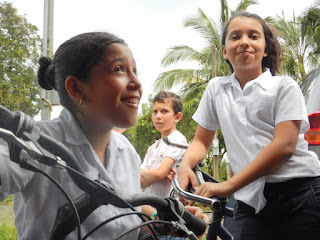Within the boundaries of Alajuela one can find stunning waterfalls, a topiary wonderland in Francisco Alvarado park, a colorful array of flora and fauna, and lush rain forests. Perhaps the biggest attraction is one of Costa Rica's largest active volcanoes, Arenal, which watches over the province.
Nestled within the rolling countryside of this flourishing area is the heart of Costa Rican rural life. Steep, winding roads steer away from traffic and crowded cities such as San José, immersing one into some of the country's richest farmland. Soil rich from the volcanic ash surrounding the area brings thriving crops of oranges, pineapple, yucca, and sugar cane.
Tourists can buy rambutan from small roadside vendors without leaving the car or by visiting the larger commercial marketplaces in more populated areas. These markets bustle with local farmers and vendors selling their products brought from farther away homes and farms. Fruits, veggies, even fine leather products like belts and saddles are sold in these community markets.
 |
| Benigno Melendez |
These bikes provide much needed, affordable transportation to farmers and merchants who need to travel many miles to reach the bigger markets to sell their home-grown products. Our bikes save them time and money by getting them to market faster and with more product to sell.
Upala
The canton of Upala has a busy commercial marketplace where small local farmers can make a decent living selling fresh fruits and vegetables. Bicycles are the most important mode of transportation in the remote villages within Upala. Benigno (above) uses his bike to travel to market four times faster and with the added basket on the back can haul four times as much produce to sell, which benefits his family greatly.
Bikes are also used by many of the children going to school in Upala. Eight-year-old Kevin (right) just received his bike in June. His mom, Yorleny travels to school with him every day. A trip that used to take over a half hour now takes only 10 minutes.
San Carlos
San Carlos stretches from the epicenter of San José to the border of Nicaragua. It is the largest canton in Alajuela. Volcán Arenal is located here and with it comes the rich soil fueled by volcanic ash, making it a fruitful agricultural center. Coffee and tubers, like cassava, are widely produced here.
In addition to helping members complete errands faster and assisting vendors with added carrying capacity, our bikes are helping students commute to school faster and stay in school. In one particular village only 35 members have acquired a college degree. They are expecting the percentage of graduates to decrease in upcoming years due to the high drop out rate in elementary and secondary schools. Many families cite high transportation costs as the reason for pulling kids out of school. Bringing bikes to these villages is increasingly important to help families and communities continue to thrive.
Spotlight Guanacaste
Spotlight Talamanca




